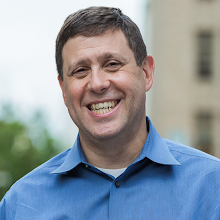He sums it pretty well in the first few paragraphs:
In his new book, "The Terror Presidency," conservative legal scholar Jack Goldsmith recalls something David Addington told him about the exercise of presidential power. Goldsmith was in the midst of a turbulent, eight-month tenure as head of the Office of Legal Counsel in the Bush Justice Department, the person responsible for determining the legality of proposed or ongoing administration actions.
Addington, legal counsel to Vice President Dick Cheney at the time, told Goldsmith, "We're going to push and push and push until some larger force makes us stop."If it is possible to crystallize in a sentence the lawless methodology of the lawless Bush administration, Addington's sentence does so. Whether ignoring bipartisan environmental statutes, defying duly ratified treaties, feigning compliance with court decisions, staining the honor of the military justice system, stonewalling congressional subpoenas, allowing incompetents to despoil government departments with impunity or trampling on the Fourth, Fifth, Sixth, Eighth and 14th Amendments to the Constitution, the Bush administration has pushed, pushed and pushed, and then continued pushing....
That depends, to use the rhetorical construction of a previous president trying to hide illicit sexual conduct, on what the definition of "torture" is. And the confirmation of federal judge Michael Mukasey, Bush's choice to succeed the duplicitous Alberto Gonzales as attorney general, now may depend on whether Mukasey continues to play along.
On July 20, Bush issued an executive order declaring that "a program of detention and interrogation operated by the Central Intelligence Agency" is consistent with Common Article 3 of the Geneva Conventions. But he could not have declared otherwise.
As ratified treaties, the Geneva Conventions are the law of the land. Their terms regarding the treatment of soldiers and civilians in times of war have long since been translated into federal criminal statutes. And on June 29, 2006, the U.S. Supreme Court ruled that, contrary to the administration's claim, Common Article 3 applies to prisoners held by the United States in connection with the war on terrorism.
But the administration's record on torture strips the executive order, as well as the president's public comments, of credibility.
On Aug. 1, 2002, Justice Department lawyer John Yoo concocted a legal analysis deconstructing the meaning of the word "severe" in ways that gave the administration's stamp of approval to virtually any treatment of prisoners short of dismemberment and burning alive. U.S. interrogators were permitted to use a wide range of torturous actions, including a near-drowning technique called "waterboarding," to extract confessions and information, at least some of which later proved demonstrably false.When Jack Goldsmith took over the Office of Legal Counsel in October 2003, he began examining some of its recent opinions. He soon withdrew Yoo's torture memo, and it was replaced on Dec. 30, 2004, with a new legal opinion that clearly and forcefully repudiated the use of any such tactics as a matter of American law.
Then the Addington push principle went to work. Four weeks ago, The New York Times revealed that in 2005, after Goldsmith left government, the Office of Legal Counsel had issued new memos reauthorizing tactics and combinations of tactics that any reasonable person outside the sway of the Bush/Cheney/Addington axis would recognize as torture.
The military justice establishment, badly shaken by the revelations of prisoner abuses in Afghanistan and Iraq and at Guantanamo, did not go along. A new Army Field Manual covering interrogations, issued in 2006, returned to the principled, humane treatment of prisoners that had been the military's proud tradition and a model for the world. The FBI, likewise, has taken steps to distance its personnel from abusive interrogations.
In contrast, Bush's dubious executive order of July applies to interrogations conducted by the CIA. These presumably include interrogations of prisoners held off the books in secret prisons scattered around the world — prisons that the president once made a point of saying had been emptied. Subsequent reporting indicated they have been repopulated.
In his confirmation hearings on Capitol Hill two weeks ago, Mukasey had no trouble condemning torture but claimed he didn't know enough about waterboarding to know if it meets the definition of the term. Late last week, all 10 Democrats on the Senate Judiciary Committee wrote to Mukasey saying that their votes on his appointment depend on whether he agrees that it does.
The Cheney/Addington never-relent methodology is the perfect vehicle for Bush's we're-on-a-mission ideology. If the cause is unassailable, then any tactic may be justified, rationalized and perpetuated.
Indeed, the combination is very much in play today in the White House's fast-shuffle dealings with Congress over secret spying programs, foreign and domestic, that the administration has been conducting without warrants since shortly after the 9/11 terrorist attacks.
The programs ignored an on-the-books law designed to make sure our government could detect threats to national security without abusing its power. They were devised without input from Congress and without the knowledge of the judges of the special court empowered to authorize secret U.S. spying operations. White House officials didn't even fully inform then-Attorney General John Ashcroft about some aspects of the programs, and wouldn't let the general counsel of the agency conducting the programs — the National Security Agency — see the internal legal opinions that supposedly justified them.
The warrantless spying went on for four years before The New York Times exposed the administration's illegal conduct in December 2005. Forced to confirm the story, Bush claimed the program involved communications only between people in the United States and suspected terrorists abroad. He was dodging; in May 2006, USA Today revealed that some telecommunications companies had been giving government spies access to the domestic call records and e-mails of millions of Americans — also without warrants. Now the administration wants to grant legal amnesty to the companies that cooperated.
What is most dangerous about the Bush administration's reckless disregard for law is that it is the very embodiment of moral relativism. Indeed, without the certain foundation of the rule of law, moral footing becomes exceedingly slippery.
In an Oct. 21 speech to the Washington Institute for Near East Policy, for example, Vice President Cheney referred approvingly to statements by historian Bernard Lewis about Middle East policies during the Cold War. "If you did anything to annoy the Russians," Cheney said, quoting from a Lewis piece for The Wall Street Journal, "punishment would be swift and dire. If you said or did anything against the Americans, not only would there be no punishment; there might even be some possibility of reward."
So the vice president of the United States regards the Soviet Union as a role model for the conduct of foreign policy.
As a deputy attorney general under John Ashcroft for two years in the Bush administration, James Comey recognized these dangers all too well. It was Comey who headed off a late-night effort by senior White House officials to get a hospitalized Ashcroft to certify a spying program as legal.
"It can be very very hard to be a conscientious attorney working in the intelligence community," he told the staff of the National Security Agency at Fort Meade, Md., in a speech on May 20, 2005. "At the outset, we [lawyers] know that the rule of law sets this nation apart and is its foundation," he said.
"The lawyer is the custodian of so much . . . most importantly of all, the custodian of our Constitution and the rule of law. . . . It takes far more than a sharp legal mind to say 'no' when it matters most. It takes moral character. . . . It takes an understanding that, in the long run, intelligence under law is the only sustainable intelligence in this country."









No comments:
Post a Comment